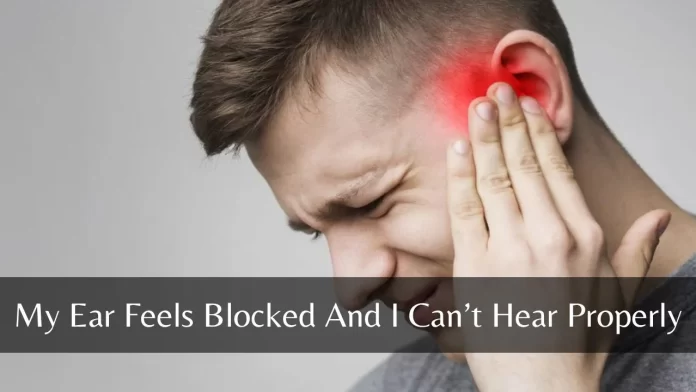The sensation of a blocked ear refers to the perception that the ear canal or middle ear is partially or completely obstructed, causing a feeling of fullness, pressure, or reduced hearing ability. This sensation can affect one or both ears and is often described as if something is blocking the passage of sound or air. It can vary in intensity from mild discomfort to more pronounced feelings of pressure.
The effects of a blocked ear on hearing can be notable and may include:
- Reduced Hearing Acuity: When the ear canal or middle ear is blocked, sound waves may have difficulty reaching the eardrum and the delicate structures of the inner ear. This can lead to a decrease in the ability to hear sounds clearly and at normal volumes.
- Muffled Sounds: Sounds may appear muffled or distorted due to the obstruction. This can make it challenging to understand speech, enjoy music, or engage in conversations.
- Altered Sense of Balance: The ear plays a role in maintaining our sense of balance. A blocked sensation can sometimes cause a slight imbalance or dizziness, especially if the sensation is due to issues within the middle ear.
- Discomfort and Pressure: A blocked ear can cause discomfort and a sensation of pressure within the ear. This discomfort can range from mild to more noticeable levels, depending on the underlying cause.
- Tinnitus: In some cases, a blocked ear sensation might be accompanied by tinnitus, which is the perception of ringing, buzzing, or other sounds in the ears that aren’t caused by external stimuli. Tinnitus can exacerbate the overall discomfort of a blocked ear.
Common Causes of Ear Blockage and Hearing Impairment:
Several common causes can lead to ear blockage and hearing impairment. These issues can vary in severity, and it’s important to identify and address the underlying cause to restore optimal hearing and ear health. Here are some common causes:
- Earwax Buildup (Cerumen Impaction): Accumulation of earwax in the ear canal can block sound waves from reaching the eardrum. This can lead to reduced hearing acuity and a sensation of ear fullness.
- Eustachian Tube Dysfunction: The Eustachian tubes connect the middle ear to the back of the throat, equalizing air pressure and draining fluids. Dysfunction of these tubes can cause a feeling of ear blockage, muffled hearing, and pressure changes.
- Ear Infections (Otitis Media or Otitis Externa): Infections of the middle or outer ear can lead to inflammation, fluid buildup, and blockage. Hearing can be impaired due to the presence of fluid or infection in the ear.
- Fluid Accumulation (Serous Otitis Media): Fluid buildup in the middle ear, often after an infection, can cause hearing difficulties and a blocked sensation. This condition is more common in children.
- Barotrauma: Sudden changes in air pressure, such as during air travel, scuba diving, or driving in mountainous areas, can cause the ears to feel blocked and affect hearing temporarily.
- Foreign Object in the Ear: Insertion of foreign objects into the ear canal, especially in children, can lead to blockage and potential damage to the ear structures.
- Perforated Eardrum: A tear or hole in the eardrum can cause hearing loss and a sensation of blockage. It can result from infections, trauma, or sudden changes in pressure.
- Otosclerosis: This condition involves abnormal bone growth in the middle ear, affecting the movement of the ossicles (tiny ear bones) and leading to hearing impairment.
- Noise-Induced Hearing Loss: Prolonged exposure to loud noises can damage the delicate hair cells in the inner ear, leading to hearing loss over time.
- Aging (Presbycusis): Gradual age-related changes in the inner ear structures can lead to hearing loss and a feeling of decreased clarity in hearing.
- Meniere’s Disease: A disorder of the inner ear that can cause episodes of vertigo, tinnitus (ringing in the ears), and fluctuating hearing loss.
Recognizing the Symptoms of a Blocked Ear:
- Hearing Impairment: One of the primary indicators of a blocked ear is a reduction in hearing clarity. Sounds may appear muffled, distant, or unclear, making it challenging to follow conversations or understand spoken words.
- Fullness or Pressure Sensation: A feeling of fullness or pressure in the affected ear is a common symptom. This sensation can be similar to the feeling you experience when flying or driving in high altitudes.
- Difficulty Equalizing Pressure: If you experience discomfort or difficulty equalizing pressure during activities like yawning, swallowing, or attempting to “pop” your ears, it could suggest Eustachian tube dysfunction.
- Tinnitus (Ringing in the Ear): Tinnitus, characterized by the perception of ringing, buzzing, or other noises in the ear, might accompany a blocked ear sensation. It can vary in intensity and affect daily activities.
- Dizziness or Imbalance: Some individuals may experience mild dizziness or imbalance due to the blocked ear affecting their sense of equilibrium.
- Pain or Discomfort: While not always present, pain or discomfort in the ear can occur, particularly if the blockage is caused by an infection or injury.
- Autophony (Hearing Your Own Voice Louder): Some people might notice that their own voice sounds unusually loud or echoes in the affected ear due to changes in the way sound waves are transmitted.
- Fluid Sensation: If the blocked ear sensation is due to fluid accumulation, you might feel as though there is fluid trapped in your ear.
Preventive Measures for Maintaining Ear Health:
Maintaining ear health is essential for overall well-being and preserving your hearing. Incorporating preventive measures into your daily routine can help minimize the risk of ear issues and promote optimal ear health. Here are some preventive measures to consider:
- Practice Good Ear Hygiene: Avoid inserting cotton swabs, fingers, or any objects into your ears. Cleaning the outer ear with a gentle washcloth is sufficient. The ear canal is designed to clean itself naturally.
- Protect Your Ears from Loud Noises: Exposure to loud noises can damage your hearing over time. Use ear protection, such as earplugs or earmuffs, in noisy environments like concerts, construction sites, or when operating loud machinery.
- Limit Use of Headphones: When using headphones or earbuds, keep the volume at a safe level. Prolonged exposure to high volumes can lead to hearing damage.
- Avoid Prolonged Moisture Exposure: Excessive moisture in the ear can lead to fungal or bacterial infections. Dry your ears thoroughly after swimming or bathing. Tilt your head to let water drain out, or use a clean, dry towel.
- Manage Allergies and Nasal Congestion: Allergies and congestion can affect Eustachian tube function. Manage allergies and congestion with appropriate treatments to prevent ear blockages.
- Stay Hydrated: Drinking enough water helps maintain the thin consistency of mucus, supporting proper Eustachian tube function.
- Quit Smoking: Smoking can contribute to various health issues, including hearing loss. Quitting smoking can have positive effects on your overall health, including your ears.
- Protect Your Ears in Harsh Environments: If you work in environments with exposure to extreme temperatures, chemicals, or loud noises, use appropriate protective gear to safeguard your ears.
- Stay Up-to-Date with Vaccinations: Certain vaccinations, like the flu vaccine, can help prevent respiratory infections that may affect the ears.
- Healthy Diet: A balanced diet rich in vitamins and minerals can support overall health, including the health of your ears.
- Monitor Your Earbuds/Headphone Usage: Avoid using earbuds or headphones for extended periods. Take breaks to give your ears a rest.
- Practice Safe Swimming: Use earplugs when swimming in contaminated water to prevent waterborne infections that can affect the ears.
Self-Care and Home Remedies:
- Stay Hydrated: Drinking plenty of water can help thin mucus and promote better drainage, especially if your blocked ear is related to congestion.
- Yawn and Swallow: Yawning and swallowing can help open the Eustachian tubes and equalize pressure in the ears. Chew gum or suck on hard candy to encourage swallowing.
- Nasal Saline Rinse: Using a saline nasal spray or performing a gentle nasal saline rinse can help clear congestion in the nasal passages, which might indirectly alleviate blocked ears.
- Warm Compress: Applying a warm, moist cloth over the affected ear can help soothe discomfort and promote better blood flow, potentially easing congestion.
- Over-the-Counter Decongestants: Over-the-counter decongestant medications (oral or nasal sprays) can help reduce nasal congestion, which might relieve pressure in the ears. However, be cautious and consult a doctor before using these, as they might not be suitable for everyone.
- Hydrogen Peroxide Drops: For earwax-related blockages, placing a few drops of warm hydrogen peroxide into the ear can help soften the wax. Follow the instructions carefully and avoid using this method if you have a history of ear issues or perforated eardrums.
- Tilt and Pull: Gently tilting your head to the side and pulling on your earlobe can help open the ear canal slightly and encourage drainage.
- Avoid Inserting Objects: It’s important not to insert cotton swabs or any other objects into the ear, as this can push wax deeper or cause injury.
- Steam Inhalation: Inhaling steam from a bowl of warm water (with a towel over your head) can help open nasal passages and relieve congestion.
When to Seek Professional Help:
- Persistent Symptoms: If your ear remains blocked and your hearing doesn’t improve after trying self-care measures for a few days, it’s advisable to consult a healthcare professional.
- Sudden Hearing Loss: If you experience a sudden and significant decrease in hearing in one or both ears, seek medical attention immediately. Sudden hearing loss could be a sign of a serious issue that requires prompt evaluation.
- Pain: If your blocked ear is accompanied by pain, discomfort, or pressure, it’s recommended to consult a doctor. Pain could indicate an infection or other underlying problem that needs attention.
- Fluid Drainage: If you notice any unusual fluid drainage from the ear, whether clear, yellow, or bloody, it’s important to see a healthcare professional, as this could be a sign of an infection.
- History of Ear Issues: If you have a history of ear problems, ear infections, or other ear-related conditions, it’s wise to consult a doctor for proper evaluation and treatment.
- Dizziness or Imbalance: If your blocked ear is causing dizziness, vertigo, or a significant sense of imbalance, it’s crucial to seek medical attention to rule out any serious conditions affecting your inner ear.
- Changes in Ear Shape or Color: If you notice any changes in the shape or color of your outer ear, or if you experience tenderness or swelling, consult a healthcare professional.
- Worsening Symptoms: If your symptoms are getting worse or new symptoms are
developing, it’s a sign that you should see a doctor for a comprehensive evaluation.
- Concern for Foreign Object: If you suspect a foreign object has become lodged in your ear, do not attempt to remove it yourself. Seek medical assistance to prevent further complications.
Medical Treatments for Ear Blockage and Hearing Issues:
- Earwax Removal: If earwax buildup is causing the blockage, a doctor may use specialized tools or techniques to safely remove the excess wax. This could include irrigation, suction, or manual removal.
- Decongestants and Antihistamines: If the blockage is due to congestion or allergies, a doctor might prescribe decongestants or antihistamines to reduce swelling and improve Eustachian tube function.
- Ear Infection Treatment: If the blockage is caused by an ear infection, the doctor may prescribe antibiotics (for bacterial infections) or antiviral medications (for viral infections) to clear the infection and reduce inflammation.
- Ear Drops: Ear drops containing antibiotic or antifungal medications might be prescribed for certain types of ear infections or other conditions affecting the ear.
- Corticosteroids: For conditions involving inflammation, such as certain types of ear infections or autoimmune disorders affecting the ear, corticosteroid medications might be recommended to reduce inflammation and alleviate symptoms.
- Removal of Foreign Objects: If the blockage is due to a foreign object lodged in the ear canal, a healthcare professional can safely remove it using specialized tools.
- Treatment for Underlying Conditions: If the ear blockage is a symptom of an underlying medical condition (such as Meniere’s disease), the doctor will address the primary condition with appropriate treatments.
- Hearing Aids: In cases of permanent hearing loss, hearing aids may be recommended to improve overall hearing ability. An audiologist can help determine the right type of hearing aid for your needs.
- Surgery: In some cases, surgical intervention may be required. This could involve repairing a perforated eardrum, addressing structural issues, or treating more complex conditions affecting the ear.
In conclusion, the sensation of a blocked ear accompanied by reduced hearing can be a frustrating experience. While there are various causes for this issue, it’s essential to promptly seek professional help if symptoms persist or worsen. Consulting a healthcare provider for accurate diagnosis and appropriate treatment威而鋼
can help restore your hearing and ensure the health of your ears.
FAQ
Q1: What are common causes of a blocked ear?
Ans: Common causes include earwax buildup, changes in pressure, foreign objects, fluid in the ear, and loud noises.
Q2: How can I clear a blocked ear at home?
Ans: Try swallowing or yawning, use a digital otoscope, or seek over-the-counter remedies. Consult a professional if needed.
Q3: When should I see a doctor for a blocked ear?
Ans: If home remedies fail, symptoms worsen, or if there’s pain, discharge, or accompanying fever, seek medical help.
Q4: What can a doctor do for a blocked ear?
Ans: A doctor can diagnose the cause, remove objects or earwax safely, provide treatment for infections, and offer further guidance.
Q5: Can a blocked ear resolve on its own?
Ans: In some cases, yes. However, if symptoms persist or worsen, medical evaluation is advisable for proper diagnosis and treatment.







